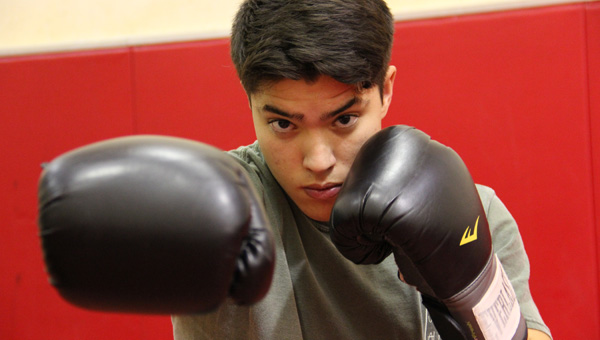When Cameron Carver heard a rumor circulating among the students in Shelby Hall about his chemistry professor, he went to the professor’s office hours to investigate. Carver had recently taken up boxing, and his professor, Shane Street, had been pegged as an experienced boxer.
Carver left Street’s office knowing the rumor was false, but he did leave with a new faculty advisor for the Alabama Boxing Club, a student organization in the process of reviving the ancient discipline.
“So many [students] talk to me, and as we talk about what we did in high school, boxing will come up,” said Carver, a sophomore majoring in business management. “And we’ll end up talking about how interested they are in boxing, and how much they would love to learn how to box.”
The idea to begin a club at The University of Alabama quickly snowballed from this collective interest.
Carver didn’t begin boxing until he had extra time toward the end of his senior year of high school. Learning the technique of boxing is both a mental and physical exercise, and excellence in the sport requires confidence in one’s own willpower and abilities, as opposed to relying on other members of a team, he said.
“Watching boxing, it looks really brutal and savage, almost,” Carver said. “But when you really get down to it, it’s almost a very physical chess game. It’s all angles and very calculated risks and is almost as much of a mental contest as it is a physical contest.”
The combination of skill sets interested Street, an associate professor of chemistry and the faculty advisor for the club. Although the rumors of an intensive boxing career were untrue, Street did box recreationally as a child and grew up watching and listening to fights with his father.
Seeing Carver’s general charisma and drive toward boxing inspired Street to agree to the faculty advising position, he said. Street said he spoke to Carver about the necessity of keeping safety a priority in the club, and he said he hopes to see the organization become established as a part of student culture that will outlast Carver’s collegiate career.
“You can tell [Carver] is into a lot of things,” Street said. “He’s an active guy, so it will be interesting to see his motivation and drive and just how far it will take him in this arena for sports.”
The boxing club plans to practice weekly at the Student Recreation Center, but Carver has been attending Skyy Boxing Gym for training since arriving at the University. While at the gym, he met Juan Carrasquilla, a sophomore majoring in mechanical engineering, who is helping start up the organization.
Like Carver, Carrasquilla didn’t begin boxing until recently. He said he finds the technique interesting and fun and appreciates having the skills for self defense as well, he said.
“I learned that fighting doesn’t solve problems. I learn it for self defense,” Carrasquilla said. “When you do boxing, you see that it’s a sport. You view it more in that light, and not so much as a means of solving problems.”
Carver and Carrasquilla trained at Skyy Boxing Gym with Jay Deas, who has been boxing since the age of 14. Deas began the gym with his brother, Tommy Deas, and the gym has been at its current Northport location for the last three years.
Skyy Boxing Gym invites patrons of all training backgrounds to learn boxing techniques, and Deas said he thinks the variety of skill levels creates a great atmosphere in the gym.
Beginning boxers like Carver and Carrasquilla may find themselves training next to other athletes with much more extensive training, like heavyweight boxer Deontay Wilder. Wilder, an Olympic medalist in boxing, is currently the number one ranked heavyweight in the world, Deas said.
“I would hope that [training alongside Wilder] would inspire [students],” Deas said. “That regardless of what their goals are – physically or scholastically or career-wise – that you can achieve what you want to if you’re willing to sacrifice and work hard enough. You can do a lot of great things.”
Deas agreed to assist Carver in starting the boxing organization and teaching at the practices at the Student Recreation Center. The practices will focus on technique rather than contact fighting. Depending on student interest, competitive events can eventually be scheduled, Deas said.
“Hopefully the students at the University get behind the boxing program and see it as an alternative workout, something that is very different and a lot of fun,” Deas said.
Cameron Calhoun, a junior majoring in biology, said he has recently been in contact with Carver and Carrasquilla about being part of the organization. Calhoun began training seriously at the end of the summer with another friend by using training equipment at home and at the Student Recreation Center. He said he is excited to see other students at the University wanting to bring the sport back to the forefront.
“To me boxing seems like more of an art form than just slugging it out,” he said. “And it’s a dying art form at that.”
Calhoun grew up watching his brother’s interest in contact sports and enjoyed the story of boxer Micky Ward, whose story is divulged in the film “The Fighter.” Ward’s story of being from a small town and working hard to make something of himself, is extremely relatable, Calhoun said.
“It’s great to see people dedicated to bringing back an ancient art form as far as sports go,” Calhoun said. “I appreciate having that opportunity and that outlet on my campus.”
Students interested in joining Alabama Boxing Club can find more information on their profile on The SOURCE’s website. The organization is for students of all technical backgrounds, from beginner to advanced, who are interested in expanding their mental and physical understanding of the sport.









